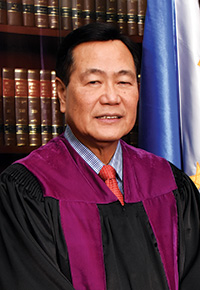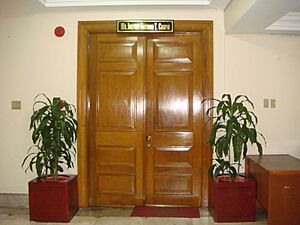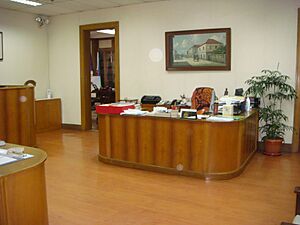Antonio Carpio facts for kids
Quick facts for kids
Antonio Carpio
|
|
|---|---|
 |
|
| 31st Senior Associate Justice of the Supreme Court of the Philippines | |
| In office November 6, 2009 – October 26, 2019 |
|
| Preceded by | Leonardo Quisumbing |
| Succeeded by | Estela Perlas-Bernabe |
| 148th Associate Justice of the Supreme Court of the Philippines | |
| In office October 26, 2001 – October 26, 2019 |
|
| Appointed by | Gloria Macapagal Arroyo |
| Preceded by | Minerva Gonzaga Reyes |
| Succeeded by | Edgardo Delos Santos |
| Personal details | |
| Born | October 26, 1949 Davao City, Philippines |
| Relations | Conchita Carpio-Morales (cousin) Mans Carpio (nephew) Diosdado Daño Tirol (nephew) |
| Education | Ateneo de Manila University (BA) University of the Philippines Diliman (LLB) |
Antonio Tirol Carpio (born October 26, 1949) is a respected former associate justice in the Philippines. He was appointed to the Supreme Court by President Gloria Macapagal Arroyo on October 26, 2001. He served for 18 years until his retirement on October 26, 2019. During his time as Senior Associate Justice, he also served as chief justice several times in an acting role. This means he temporarily took on the top judicial position.
Contents
Early Life and Education
Antonio Carpio was born in Davao City, Philippines. His parents were Bernardo Dumlao Carpio and Sol Gonzales Tirol. He completed his elementary and high school education at the Ateneo de Davao University. Later, he married Bach Yen "Ruth" Nguyen Carpio.
College and Law School
Carpio studied Economics at the Ateneo de Manila University, finishing in 1970. He then went to the University of the Philippines College of Law at UP Diliman. He graduated in 1975 as the valedictorian of his class and with honors (cum laude).
While in law school, he was very active. He was the Chairman of the editorial board for the Philippine Law Journal. He also served as the editor-in-chief of The Guidon and Managing Editor of the Philippine Collegian. In the 1975 Philippine Bar Examination, he ranked sixth among all test-takers.
Career Before the Supreme Court
After finishing law school, Antonio Carpio worked as a private lawyer. In 1980, he helped start a law firm that became very successful. He also shared his knowledge by teaching law at the University of the Philippines College of Law from 1983 to 1992. From 1993 to 1998, he was a member of the Board of Regents for the University of the Philippines.
Role in Government
In 1992, Carpio joined the government under President Fidel Ramos. He served as the chief legal advisor to the President. In this role, he helped bring about important changes in industries like telecommunications, shipping, and insurance.
After President Ramos's term, Carpio returned to private law practice. He also wrote a regular opinion column for the Philippine Daily Inquirer newspaper.
Service in the Supreme Court
Antonio Carpio was the first person appointed to the Supreme Court of the Philippines by President Gloria Macapagal Arroyo in January 2001. At 52 years old, he was one of the youngest justices to be appointed to the highest court in the country.

Acting Chief Justice
As the most senior associate justice, Carpio often stepped in as the acting chief justice. This happened when the chief justice position was empty. For example, he served as acting chief justice from May 29, 2012, until a new chief justice was appointed. He also took on this role again on March 1, 2018.
Carpio holds the record for serving the longest as an acting chief justice, for eight months. He also served as an associate justice for 18 years. This is one of the longest tenures in the court's history.
Key Responsibilities
During his time on the Supreme Court, Carpio led important committees. He chaired the court's Second Division and the Senate Electoral Tribunal. He also headed the committee responsible for updating the Rules of Court, which are the rules for how legal cases are handled.
Retirement
Justice Carpio retired from the Supreme Court on October 26, 2019, when he reached the mandatory retirement age. He chose not to have a big public retirement ceremony. Instead, he had a private dinner with a few selected guests.
Awards and Recognition
Antonio Carpio has received many awards for his service.
- In 1998, President Fidel Ramos gave him the Presidential Medal of Merit. This was for his "distinguished and exemplary service" to the country.
- He received the Outstanding Achievement in Law Award from the Ateneo de Manila Alumni Association.
- He was given an honorary Doctorate of Laws from the Ateneo de Davao University.
- The University of the Philippines Alumni Association recognized him twice. In 2015, he was named Outstanding U.P. Alumni in Public International Law. In 2017, he was named the Most Distinguished Alumni.
South China Sea Dispute
One of Antonio Carpio's most important personal causes was protecting the Philippines' rights in the West Philippine Sea. This area is part of the South China Sea and is claimed by the Philippines.
He strongly believes that people in all countries involved should understand the issue. He thinks this understanding can help prevent extreme nationalism and lead to a fair solution. This solution should be based on international law, like the United Nations Convention on the Law of the Sea (UNCLOS), and historical facts.
Advocating for the Philippines
Carpio called some actions in the South China Sea a "grand theft of the global commons." He argued that the Philippines was fighting a legal battle not just for itself, but for all countries. He believed that a victory for the Philippines would be a victory for all nations that China had prevented from using parts of the South China Sea.
In 2015, the Philippine Department of Foreign Affairs supported Carpio. They sent him on a world tour to give lectures about the South China Sea dispute. He presented the Philippines' historical and legal arguments in 30 cities across 17 countries.
Published Work
In May 2017, Carpio published an eBook titled "The South China Sea Dispute: Philippine Sovereign Rights and Jurisdiction in the West Philippine Sea". This book contains over 140 of his lectures and speeches. Its goal was to explain the dispute in simple language. It also aimed to convince the Chinese people that China's "nine-dashed line" claim has no legal or historical basis.
Images for kids
-
Carpio in 2013, groundfloor, SC
 | Leon Lynch |
 | Milton P. Webster |
 | Ferdinand Smith |



